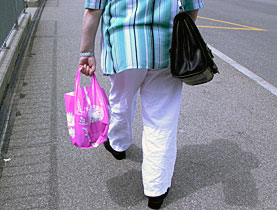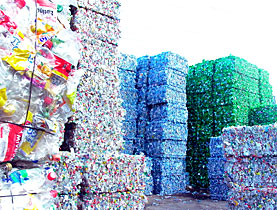Campaigners target single-use plastic bags

Shoppers reach for them automatically every day but moves are underway to break up our love affair with single-use plastic bags.
Inspired by the global trend to do away with these polyethylene pests, a Swiss parliamentarian is calling on the government to ban non-reusable bags in the retail sector.
Making the point that these flimsy carrier bags are only in use for an average of 25 minutes, Dominique de Buman says Switzerland should set a better example in the politics of the three Rs – reduce, reuse and recycle.
China has just introduced a ban on such bags, Australia will do the same by the end of the year and, closer to home, supermarkets in neighbouring France have already done away with them. But does that mean that there is a pressing case for bag banning in Switzerland?
Peter Gerber of the Federal Environment Office’s waste and raw materials division argues against the proposal.
“Different countries have different reasons for taking this step, reasons that don’t necessarily apply to Switzerland.”
“A lot depends on the waste management infrastructure. In Switzerland 100 per cent of consumer waste is incinerated with good techniques. It creates minimal air pollution and produces energy,” he told swissinfo.
Litter
Gerber says the case against these bags is much stronger in countries where all municipal waste is sent to landfill dumps and where littering is a serious problem.
“There are a lot of used plastic bags worldwide polluting the coasts, the sea and the ground. But that’s a problem of littering. You have to educate people not to litter. The bags take hundreds of years to be broken down.”
In Switzerland only five per cent of all litter material is plastic bags, according to Gerber. “We have a bigger problem with fast food packaging.”
For his part, De Buman of the centre-right Christian Democratic Party says it is a global question that relates to the use of natural resources.
“There is now an enormous global demand for oil, particularly in the emerging countries and the price is at an all-time high.
“It is ridiculous to use a material which is non renewable for things which do not last. It is a waste and puts extra pressure on prices,” he said.
A lot can be achieved through changes in behaviour, for example carrying bags around for re-use, de Buman told swissinfo.
“The realities of the impact on the environment are there and we finally have the proof in rising oil prices.”
Levy
Polyethylene is the most widely used packaging plastic in the world. Rather than a ban on single-use bags, Gerber supports other solutions, including a levy or increasing awareness to change consumer habits.
“It will be difficult to replace them. The alternatives for these plastic bags are not so good if you compare a life cycle assessment.”
“In Switzerland we have a tax of SFr0.325 [$0.31] for the bigger, stronger plastic bags. When something costs it has a value and so people are motivated to use it several times,” Gerber added.
The debate can also be extended to other single-use plastic object such as drinking cups and postal packaging.
“For only one use it takes less material and energy to produce the plastic option but if the object can be reused, other materials make more sense,” he said.
Switzerland’s two largest retailers Migros and Coop distribute 270 million ultra-thin bags every year, some in the fruit and vegetable or other departments, some at the tills.
Coop spokesman Karl Weisskopf told swissinfo that it would be difficult to find alternatives to the polyethylene bags that would be lightweight, transparent and eco-friendly.
“We have naturally looked at alternatives from renewable or biodegradable sources, such as maize, but then we come up against the same problem that arises with biofuels. Does it make sense to use potential foodstuff for packaging?”
De Buman’s motion, filed last month, still has to be approved by both chambers of the federal parliament.
Moves are also underway in several Swiss cantons to ban or limit the use of polyethylene bags.
The European Union – which does not include Switzerland – wants to replace plastic bags by biodegradable packaging material by 2010.
Switzerland’s two largest retailers Migros and Coop distribute 270 million single-use free plastic bags annually.
Between them they sell 23 million durable plastic bags per year.
Coop sells 28 million reusable paper carrier bags per year.
The Federal Materials, Science and Technology Institute (Empa) carried out a study comparing the environmental impact of polyethylene bags with that of paper and cotton bags.
When they are only used once, the plastic version comes out on top because the production of polyethylene requires less raw materials and energy than the other options.
However, the other materials are usually intended for multiple usage. Cotton is the winner after it is used ten times, the study found.

In compliance with the JTI standards
More: SWI swissinfo.ch certified by the Journalism Trust Initiative





You can find an overview of ongoing debates with our journalists here . Please join us!
If you want to start a conversation about a topic raised in this article or want to report factual errors, email us at english@swissinfo.ch.